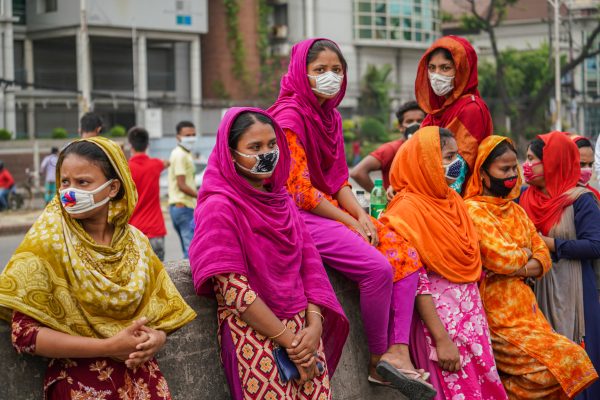This website uses cookies so that we can provide you with the best user experience possible. Cookie information is stored in your browser and performs functions such as recognising you when you return to our website and helping our team to understand which sections of the website you find most interesting and useful.

As the EU develops its future sustainable corporate governance directive, civil society organisations outline why and how environmental protection must be integrated into companies’ due diligence requirements alongside respect for human rights.
The global dispersion of value chains has led to dramatic increases in carbon emissions. Most emissions come from suppliers abroad, with fossil fuel, agriculture, textile, transportation, construction and technology industries being the worst offenders.
Just 100 fossil fuel companies, including major EU ones, have been the source of more than 70% of the world’s greenhouse gas emissions since 1988. European polluters are now increasingly under fire for contributing to the climate catastrophe. German energy company RWE, Europe’s largest CO2 emitter, is being blamed for the impact of its activities on climate change by a Peruvian farmer whose home is acutely threatened by the potential collapse of two glaciers into a nearby lake as a consequence of global warming.
But the problem isn’t just emissions. From food to fashion, dirty parts of production are increasingly outsourced to bypass strong environmental standards.
Such unsustainable business activities pose risks to the environment at home and abroad. As the EU continues to import foods like soy beans and coffee grown using banned hazardous pesticides like Bayer’s highly toxic weed killer, thousands of Brazilian farm labourers and people from rural communities become ill or die from contact with agrochemicals every year, while biodiversity and wildlife is also severely affected.
There is currently no EU law to address these adverse business impacts.

© Public Eye. Hundreds of farmers in India suffered from poisoning after the increased use of pesticides by Swiss agrochemical company Syngenta.
Deep connections between the environment and human rights have increasingly been recognised by governments, courts, international organisations and societies. The full enjoyment of many rights such as the right to food, the right to water, the right to a healthy standard of living, and the rights of indigenous peoples is directly connected to the environment.
This is clear for instance, in the case of Shell in Nigeria, where devastating oil spills have caused large-scale, continued contamination of the groundwater and soil, harming the vegetation and fauna in the area and causing a multitude of human rights impacts including harms to health and livelihoods of local communities.
For many environmental defenders, human rights and environmental concerns are also unavoidably interlinked given the violent retaliation they often face for their environmental work.
However, approaching environment protection in the future directive solely through the lens of human rights would leave an important gap in the regulatory framework. Both human rights and the environment deserve protection in and of themselves.
As the largest trading bloc in the world, the EU has the responsibility to take action to stop business activity from causing and contributing to serious and irreversible environmental harm and loss of natural resources at home and abroad.
For the EU to live up to its ambitions for environmental leadership, as set out in the European Green Deal and through its global climate commitments, it must address the sustainability of EU business practices.
Back in March, the European Parliament gave the Commission an undeniable mandate to introduce legislation requiring companies to exercise due diligence, holding companies liable for harms perpetrated, and providing people affected by environmental damage with access to judicial remedy.
As a starting point, the European Commission must define environmental due diligence as the obligation of companies to take all measures to identify, assess, prevent, mitigate or cease adverse environmental impacts in their operations, subsidiaries and business relationships throughout their entire value chains. They must also track and monitor the effectiveness of the actions taken.
The upcoming proposal must cover all potential or actual adverse impacts related to:
- climate change (including greenhouse gas emissions)
- air, soil, water and noise pollution (including through disposal of chemicals)
- hazardous substances and production of waste
- loss of and damage to forests and natural ecosystems, loss of biodiversity, and loss of habitats and species.
On this basis, companies will be obligated to complete a due diligence process to ensure that their products are not linked to these impacts.
Future EU legislation must therefore specify criteria for corporate climate targets and ensure that companies set concrete goals and targets to bring them in line with the 1.5-degree target scenario of the Paris Agreement.

© Vincenzo Lullo. Photo from a protest in London in 2020.
The grim reality is that corporate environmental abuses are being perpetrated against the people least responsible for wrecking the environment. This is why companies must be held liable for failure to prevent environmental harms via a mix of civil, administrative and criminal liability, while fulfilment of due diligence obligations should not automatically absolve them of their responsibility.
It is also critical that the directive provides mechanisms to remedy environmental damage.
The future Sustainable Corporate Governance directive could be one of the most important pieces of industry legislation ever. It would be the first legally binding initiative to clean up corporate global value chains, and would force businesses to do more to protect the environment. But success will depend on whether states will effectively enforce damage prevention and whether people can seek remedy before EU courts the next time a company fails to prevent the preventable.
For more information, read our position paper:
This position paper has been endorsed by ActionAid, Amnesty International, Anti-Slavery International, the Business & Human Rights Resource Centre, CIDSE, ClientEarth, the European Coalition for Corporate Justice (ECCJ), the Fair Trade Advocacy Office, Fern, the International Federation for Human Rights (FIDH), Forest Peoples Programme, Global Witness and WWF.












